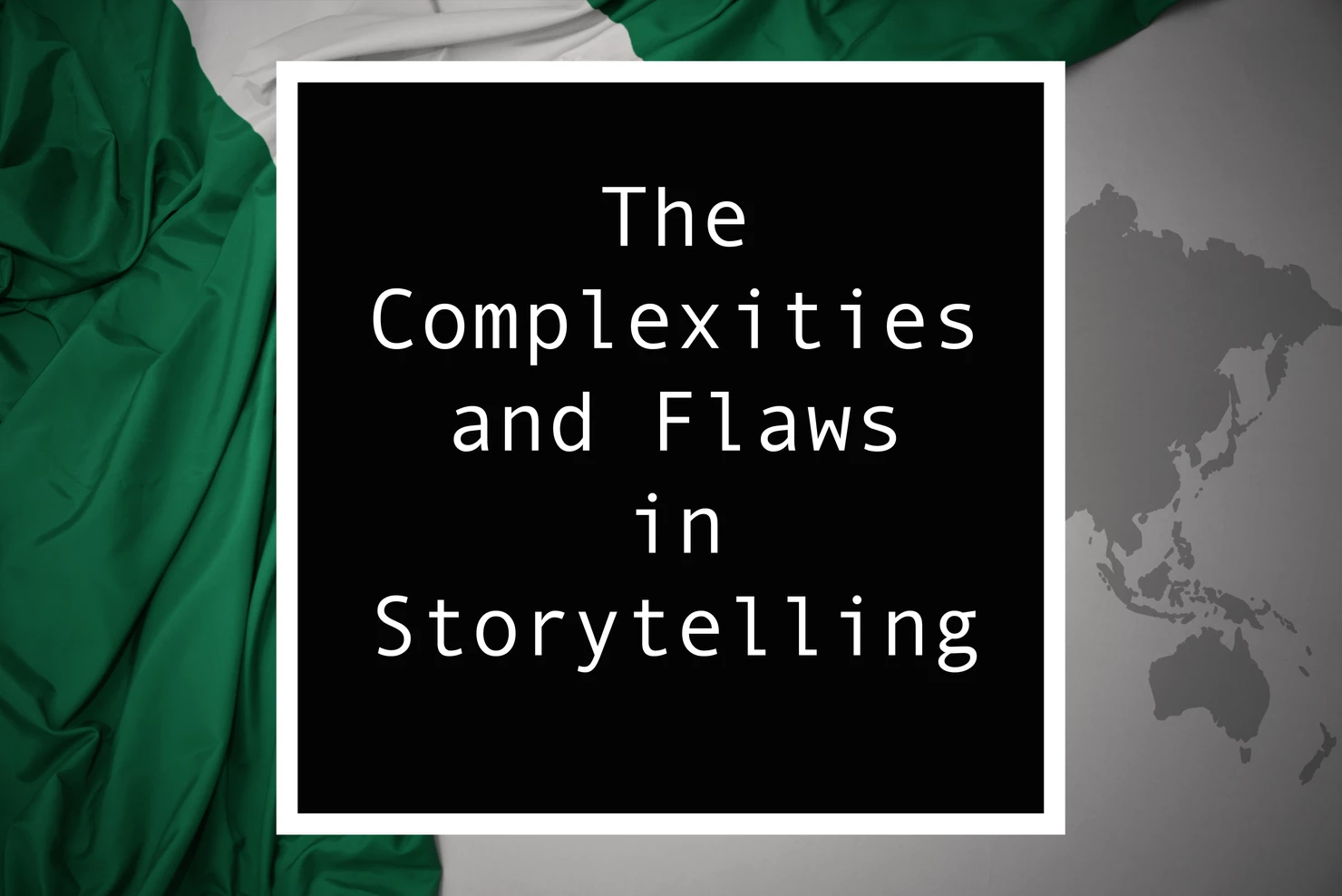There is Power in a story, but there are also Complexities and Flaws
Storytelling can be a weapon or a white flag. It could be used to incite wars or further aggrandize raging ones just as it could be used to enhance peace and unity. Tell the story of the Israeli-Palestine conflict and forget to mention that the two nations have deep historic, emotional, ethnic, and religious ties to the contested land(s) and you would make a monster of one of the two. The problem of making a monster is that, in so doing, you would have also made a prey that feels justified to fight against ‘injustice’ even in the most unjust ways possible.
But tell this same story and remember to mention that, every time there is a clash between the two nations, regardless of politics or religion or ethnicity or even right and wrong, it is often poor vulnerable women and children that bear a chunk of the anger with their blood and lives. Tell the story this way and we could hope that the years ahead will be brighter than the years past.
The HOW of Storytelling
How a story is being told is just as important as the story itself. This is because a story told well is a living entity; it has a voice and emotion. It moves, grows, reproduces (often less detailed and less factual versions of itself) and sometimes it dies. Tell the story of Africa and forget to mention that our fathers were farmers, herders, craftsmen, hunters, and many other things; that they had governments, common laws, codes of conduct, and ethics before the encroachment of Western Imperialism and there would be no dignity in being called an African.
Forget to tell the stories of ‘How Europe Underdeveloped Africa’, or to mention that poverty anywhere in the world is manmade, then you would have also told a story of Africans being some ‘senseless naked-walking good-for-nothing savages’ sitting all night and day at the seashores, waiting to be exploited by a kind and good looking European. But to tell the stories of our exploitations by the Europeans alone and stop there will be to give too much credit to the White Man for being the sole and only reason for our predicament as a people.
The stories of our fathers trading their sons and daughters, brothers and sisters for a spoon of sugar, a bottle of alcohol, a glass of mirror, etc., despite knowing the pains and dangers that accompany the Slave-trade must also be told. We must never forget to include the fact that a man’s true enemy is the one from his household – despite tireless efforts by the west to pay for their crimes, our leaders would rather have us poor and broken as far as they become rich and satisfied.
To tell the African story and exaggerate any of these components would be to tell a story that is not true. To exclude any of these components would be to misinform and at the least, tell an incomplete story. Misinformation anywhere is a greater threat to truth and knowledge than ignorance.
The WHO of Storytelling
In a very practical sense, there is never a complete story. This is because there is no such thing as an omniscient perspective to a true (none fictional) story. At best, we could only take caution and avoid what Chimamanda Adichie calls, ‘The Danger of a Single Story’ and pay more attention to Chinua Achebe’s, ‘A Balance of Stories’. Thus, it is not only how a story is being told that is important, who tells it also matters; it greatly matters.
What role did the storyteller play in the story or what connection do they have to the story? Where was the storyteller when the events of the story unfolded? Why is the storyteller telling the story and why are they telling it at the time they are?
These questions are important because every story inherits the credibility of its teller and determines to what extent credulity could be stretched. They are important questions because, if the motive backing a true story, no matter how true and how well told the story is, is perverse, it will wreak as much havoc as a lie, if not more. Let a German White Supremacist tell you the story of the Holocaust and the inhumane atrocities committed at the Nazi concentration camps, you would not be wrong to think Anti-Semitism is only a politically coined and propagated concept. But read Victor Franklin’s account of the concentration camp in his ‘Man search for Meaning’, you would come to a different conclusion.
Let a Christian Catholic monk tell you the stories of the crusades carried out by the early Roman Catholic Church and you would swear that men have never used the name of God to advance their course in Christendom. But read of the crusades from the writings of academic or Arabic scholars, you would discover that there was more of men, politics, ego, and a quest for riches than God in the crusades.
Let an Islamic extremist tell of the stories of ‘Jihad’ and you would see a noble cause worth fighting for and perceive the Jihadists as noblemen of character and great courage. But read of 9/11 or ISIS beheading harmless journalists and you would have discovered a long trail of cowardice and cruelty in the Jihadist movement from time memorial.
All these are to say, WHO tells a story and WHY it is told is just as important as HOW the story is being told. It is for these reasons (the ‘HOW, WHO, WHY’ and sometimes ‘WHEN’ of stories) that we must read stories with some degree of carefulness, knowing full well that all of a story cannot be told no matter how exhaustive the story is being told. There will always be something not said, a perspective not explored, a bias difficult to discover, and a degree of euphemism or exaggeration; there will always be narrowness to stories.
Privilege
Helon Habila, in his ‘Measuring Times,’ points us to a major loophole in the way stories are told; especially historic stories. History is often told by the rich and privileged, with the rich and privileged taking preeminence. The problem with this is not only that ‘privileges blind’ but also that, although the stories of the rich are true, they are a poor representation of reality for the time and people they speak for. The rich and privileged are often societal outliers.
Read the story of the ancient civilization in Egypt, what you would have is a story of great Pharaohs and scholars, and mighty constructions of pyramids and tombs, not a story of ordinary people living everyday life. This loophole is prevalent in the way history is being told everywhere in the world; it is a flaw in the way we tell stories.
There is a major problem in the way we tell the stories of heroes; especially national and spiritual heroes. There is a way we consciously amplify their strengths and virtues, which is not bad in itself, but seek to make light or excuse their weaknesses and obvious moral failures. The problem with telling stories this way is that it gives a wrong picture of who they truly were. It gives us an idea that they were beyond-human persons we should not aspire to be like in the light of our weaknesses.
Tell the story of Nelson Mandela as some quiet, gentle, and ‘all loving and hugging’ leader and you will never understand the man Mandela. Unlike Martin Luther Jr., Nelson only believed in non-violent resistance to oppression as a means to liberty not a principle to adhere to at all times. Again, to consciously refuse to talk about the extra-marital affairs of Martin Luther Jr even when necessary will be to present him as a saint and a perfect civil rights fighter. To insist on not talking about the mistakes of Mother Theresa when she was much younger – having an abortion, is to refuse to give hope to young girls who have made similar mistakes and are willing to change.
The truth is, they too can be the Mother Theresa(s) of our time. If we must tell the stories of heroes, then we should tell their stories with balance. I believe that more lessons will be learned from the fall and rise of heroes than from their successes alone.
Storytelling is Complex
The truth is, these complexities and flaws in stories are simply human complexity and flaws. The more we understand them for what they are, the more we will learn to meaningfully engage stories and glean more good from them; the more we will be able to spot biases in stories and pay lesser attention to them. We should tell and read stories with a sincere and genuine sense of humility because of these complexities and flaws and many more that accompany storytelling. Stories are complex and flawed.






